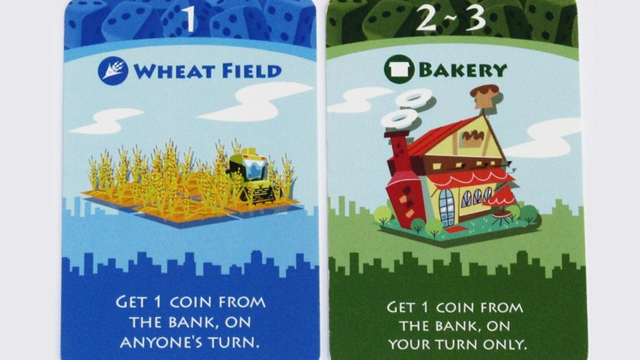
If you are at all familiar with modern board games, you’ve likely been exposed to The Settlers of Catan. Klaus Teuber’s 1993 design helped to change the face of the hobby, kicking off the “eurogame” revolution. At the time, it was a massive paradigm shift for players who had been raised on Parker Brothers and Milton Bradley fare for generations. To this day, it is still a leading “gateway game” for introducing new players to the wider world of board games outside of the mass-market stalwarts.
Over two decades later, Catan has been expanded, iterated and spun off into countless variations, but the core gameplay has not changed: the roll of two dice determines which terrains generate resources for players who have built structures adjacent to them. These resources are then turned into new structures or other advantages. If you don’t have the materials you need, you can trade with other players or even straight-up convert multiples of one into a single of another. The game ends when one player reaches a specific point threshold, and there is very little direct competition between players along the way.
The fact that Catan has survived for so long despite sweeping innovations in game design theory in the intervening years speaks to the elegance if its own design. That said, many players have seen its shortcomings — chief among them the chance of the dice simply not going your way, rendering you essentially impotent, as well as the kingmaking aspects of trading — and moved on to other titles. It still isn’t as universally-reviled as something like Monopoly, but many copies have accumulated a substantial amount of dust nonetheless.
The roots of Catan can occasionally be seen in more modern designs. Machi Koro, a 2012 design from Masao Suganuma that was recently brought to the West, is one of the most Catan-like titles I have played in some time. Players still generate resources based on a die roll and the structures they have constructed, turning those resources into more structures (in this case an array of 15 shops and other services). But there are several key differences that make Machi Koro a bit more palatable for me and others of my mindset.

The most obvious change is that there is only the one resource: cash. You no longer have to trade your excess lumber for wool or whatever else you need; either you have the cash to do what you want or you don’t. You can still fall behind if the dice don’t fall your way, but it’s much easier to catch up as long as your numbers come up at all.
Another change is the timing of resource generation. In Catan, everyone’s settlements and cities are online at all times (ignoring the effect of the bandit). If the same number gets rolled four times in a row, the same players’ resources will be generated, leading to a huge advantage. Machi Koro has some shops that work like this, but also has ones that only work on your turn (usually to a larger payoff) as well as ones that only work on opponents’ turns and steal coins from them before their own structures activate.
Finally, the victory condition has been changed from a flat threshold of points to a specific set of landmarks that must be completed. Each landmark provides unique benefits to players that have completed them, and they can do so in any order depending on their strategy. Some landmarks don’t actually have an effect unless less expensive landmarks have been completed — you can’t roll doubles if you’re only rolling one die — but in general you can still do pretty much whatever you want.
In the base game, this even applies to which structures you build. Every available shop is laid out at the start of the game, with their costs being the only restriction as to which ones you can buy at any given time. This allows you to pursue various strategies. If you want to specialize in the parasitic red shops that steal coins from other players but do nothing on your own turn, that’s your option. You can focus on a small group of numbers and hope your shops’ synergies pay off or cast a wide net to accumulate a little on every roll. The only limitation is how many of a given shop are available.

Base Machi Koro is quick-playing and fun enough, but the Dominion-like card layout felt unsatisfying to me. Games felt like a race to the most efficient shops, and the familiar sinking feeling of watching everything but my own relevant numbers come up wasn’t helping. Something felt like it was missing. As it turns out, and as strange as this might seem coming from me, that missing element was a bit more randomness.
Machi Koro: Harbor Expansion allows the game to support a fifth player, and also expands the victory conditions to six landmarks instead of the base game’s four. You also get a pre-built City Hall that provides you a single coin if you have zero after you roll, which is handy. More importantly, it also adds a bunch of new shops. In fact, it adds too many to make a meaningful array.
The solution here is to just shuffle all of the shops into one big deck and deal out an array of ten unique shops. Any duplicates you find are placed on their respective piles, and when a pile is exhausted a new card is dealt until there are once again ten shops available. Much like the transition between Dominion and Ascension, this made all the difference for me.
Now the lurking potential of a dominating strategy is mitigated by the fact that the pieces for that strategy might not be available in a timely manner, forcing players to be more adaptable to their changing options each turn. The tradeoff is that there is a chance of no cheap shops being available, but turns where nobody buys anything move quickly and eventually someone will hit enough coins to buy something. Extra landmarks also mean additional strategic options, which is always a plus.
Whether you play with or without Harbor, Machi Koro is a great lightweight game with meaningful choices that plays in 30-40 minutes. The recommended age is seven and up, mostly for a minimal amount of required reading and some basic math, making it ideal for families.
Machi Koro retails for $30 and the Harbor Expansion for $20.



















